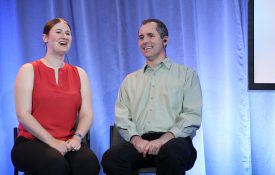-

Registered Replication Report Investigates Attentional SNARC Effect
APS is launching a Registered Replication Report project focusing on the finding that merely perceiving a number can lead to shifts in visual attention to either the left or right side of space, depending on the magnitude of the number.
-

Improving the Reproducibility of Our Research Practices
APS presents a six-part workshop with APS Fellow Brian Nosek, University of Virginia and Executive Director, Center for Open Science (COS), and Courtney Soderberg, COS Statistical and Methodological Consultant.
-

NIH-Wide Policy Doubles Down on Scientific Rigor and Reproducibility
One of the largest governmental funders of psychological science is stepping up its
focus on rigor and transparency in the research plans outlined in grant proposals. -
Turns Out, Faking a Smile Might Not Make You Happier After All
Live Science: Perhaps you’ve heard that you can brighten your mood just by faking a smile. But that idea, which came out of a psychological experiment from the 1980s, may not be true after all, as scientists were
-

Two Priming Effects to Be Examined in New Registered Replication Reports With Combined Protocol
APS is excited to announce two new Registered Replication Report (RRR) projects. These reports will be published in APS’s new journal, Advances in Methodologies and Practices in Psychological Science
-
Improving Research Practices, From Beginning to End
Efforts to promote replication, preregistration, and new analytic approaches now represent just some of the advances psychological scientists have been making toward improving research practices in the field. With the recognition that long-accepted research practices

